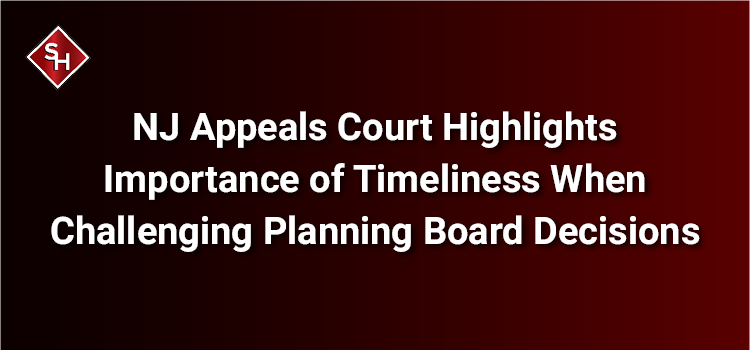
In Hassan v. Borough of Emerson, the Appellate Division of the New Jersey Superior Court held that a plaintiff’s complaint in lieu of prerogative writs challenging a resolution granting site approval for a redevelopment project was time-barred because it was not filed within the required 45-day period. The court’s decision serves as an important reminder that time is of the essence when seeking to challenge a planning board decision.
Timeline for Actions in Lieu of Prerogative Writs Under Rule 4:69-6
Rule 4:69-6 governs the time period for filing of a complaint in lieu of prerogative writs. Rule 4:69-6 (a) provides that actions in lieu of prerogative writs must be filed within 45 days after the accrual of the right to the review, hearing, or relief claimed.
Nevertheless, Rule 4:69-6(c) allows for an enlargement of that period “where it is manifest that the interest of justice so requires.” The New Jersey Supreme Court has identified three categories that qualify under this exception: (1) important and novel constitutional questions; (2) informal or ex parte determinations of legal questions by administrative officials; and (3) important public rather than private interests which require adjudication or clarification.
Facts of Hassan v. Borough of Emerson
On September 7, 2004, the Borough of Emerson (the Borough) accepted the findings of its Planning Board and adopted a resolution that designated certain properties in Emerson as being “an area in need of redevelopment,” pursuant to the Local Redevelopment and Housing Law (LRHL). On June 27, 2016, the Borough entered into a redevelopment agreement for the Project with Emerson Redevelopers. On December 23, 2016, the Borough published a notice of the Borough council’s ordinances adopted on various dates in 2006, 2010, and 2016, which approved a redevelopment plan to supersede the existing zoning for the designated properties. On January 17, 2017, the Borough adopted a resolution confirming that the designated properties continued “to qualify as an ‘area in need of redevelopment.'” On November 28, 2017, the Borough and the Fair Share Housing Center entered into a settlement agreement in the declaratory judgment action regarding the Borough’s Mount Laurel obligations.
Following a hearing on December 10, 2018, the Board approved a site plan application for the Project submitted by Emerson Redevelopers Urban Renewal, LLC (Emerson Redevelopers). On December 28, 2018, the Board adopted a twenty-five-page resolution memorializing its site plan approval. On January 4, 2019, the Board published in The Record a notice of the adoption of the resolution. In the declaratory judgment action filed by the Borough, on January 25, 2019, the court awarded the Borough a conditional judgment of compliance and repose.
On March 27, 2019, Plaintiff, a former tenant of a property included in a redevelopment project (the Project) in the Borough filed a complaint in lieu of prerogative writs against the Borough, after the Borough Land Use Board (the Board) adopted a resolution on December 28, 2018, granting site plan approval for the Project to Emerson Redevelopers Urban Renewal, LLC (Emerson Redevelopers). Plaintiff alleged the Board’s approval of the Project “was a misuse” of the LRHL, and “nothing more than an egregious act of profiteering of developers[.]” Plaintiff did not include the Board or Emerson Redevelopers as parties. However, Emerson Redevelopers obtained a copy of plaintiff’s complaint and subsequently filed a motion to join the action as an “indispensable party,” and to dismiss the complaint.
The trial court granted the motion filed by Emerson Redevelopers to join the matter as an indispensable party and to dismiss plaintiff’s complaint with prejudice. In its subsequent opinion, the trial court noted that plaintiff “[e]ssentially . . . protests the Borough’s adoption of a redevelopment plan for the Central Business District[.]” The court held that the forty-five-day period for plaintiff to file a complaint ended on February 20, 2019, yet plaintiff did not file his action until March 27, 2019. The court found it significant “that the Borough’s designation of the property as an area in need of redevelopment occurred more than fourteen (14) years prior to the filing of the complaint.” Finding no compelling reason to extend the time for plaintiff to bring his claims, the court dismissed his complaint as time barred.
Appellate Division’s Decision in Hassan v. Borough of Emerson
The Appellate Division affirmed. The appeals court agreed that the Plaintiff’s claim did not fall within any of the exceptions under Rule 4:69-6(c). As the court explained in its opinion:
Plaintiff’s opposition to Emerson Redevelopers’ motion contained no explanation for his failure to file his complaint within forty-five days of the challenged action, nor did he identify any important public interests which require adjudication or clarification. Moreover, while plaintiff’s complaint states he “seeks relief” from the Board’s resolution granting site plan approval for the Project, a cursory review of his complaint reveals he really seeks to challenge the Borough’s designation of the properties included in the Project as an area in need of redevelopment under the LRHL. As the trial court noted, the redevelopment area designation in this case first occurred more than fourteen years before plaintiff filed his complaint.
The Appellate Division further noted that the Borough has relied upon the challenged Project to achieve Mount Laurel compliance. “Under these circumstances, we are satisfied the trial court did not abuse its discretion by declining to enlarge the time provided in Rule 4:69-6(a),” the court wrote.
For more information about the court’s decision or the legal issues involved, we encourage you to contact a member of Scarinci Hollenbeck’s Government Law Group at 201-896-4100.
